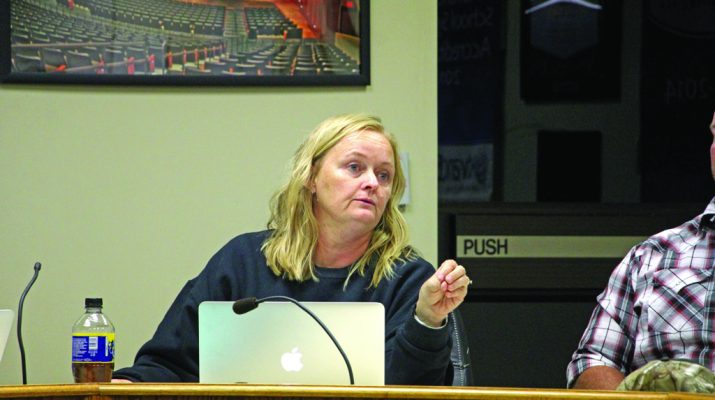The motion to approve a proposed drug testing program at Alliance Public Schools failed on Monday night, with a final vote of 4-2.
The proposed program, which was introduced at the school board meeting in August, was reviewed by the District’s Attorney prior to Monday’s meeting. Superintendent Dr. Troy Unzicker said he hosted a community forum to gather feedback on Aug. 24, as well as posted a survey on the school’s website. Unzicker explained that he provided that information to board members.
Unzicker noted that there were a total of 294 responses to the survey posted on the website, with 65 percent of respondents agreeing with the implementation of the program at Alliance High School and Alliance Middle School, 30 percent opposed to the program as a whole and 5 percent supporting the program at either AHS or AMS, but not both schools.
School Board Member Shana Brown asked about the counseling resources available for the students who test positive.
“My worst nightmare is we implement this and the kids do what they have to do, and they can’t get the resources to get back when they need to,” said Brown.
Chairperson of the Wellness Committee Amanda Clark responded that the policy was altered from having students meet with a licensed drug and alcohol counselor to having students receive an evaluation from a counselor.
“Based on the recommendation of that, depending on data, things that are coming through that meeting, they could recommend an LDAC, which is a licensed drug and alcohol counselor,” said Clark.
Brown also asked that students who are being tested understand the types of substances being tested for. Clark explained that students would be informed of that before the test is implemented. She said implementing nicotine tests would come with an additional cost.
Brown moved to approve the implementation of the program, and her motion was seconded by Board Member Jake Sylvester. Board President Tim Kollars asked for any discussion by the board before the vote, offering his position on the program.
“Well, my point on this is we’re a public school,” said Kollars. “We’re not the parents. We’re not the cops. We’re not drug enforcement, and we’re not a social service. I don’t think the school has any business mandatorily testing our activities kids. There’s very little information out there that shows that these tests are effective in all the cases, and there are very few schools in the state who even do it, less than 15 percent. We’re splitting off a section of the student body to be tested. I don’t believe this is the right thing to do. It’s just wrong.”
Board Member Josh Freiberger said he agreed with Kollars, citing government overreach. Kollars said if it was the whole student body, it may be different. Brown said that it could be the whole student body if parents enroll their children in the program. Kollars said that if every concerned parent could sign up their student, they could test them now. Freiberger said if the hospital was willing to donate tests for the program, they could donate tests for the parents.
“If the hospital is willing to donate drug tests, and I’m concerned my kid is on drugs, I don’t need the school to do it,” Freiberger said. “Still donate those tests, and I’ll take my kid up there to test. It’s an overreach by government.”
Clark explained that the program is not meant as a way to get students in trouble. Instead, the program is meant to help students who are struggling with addiction.
“I’m thinking about it as more proactive and preventative,” said Clark. “I think just having conversations with student athletes already, and having them come to me and say, ‘Hey, I have been using nicotine, can you please help me stop?’ Kids are crying for help. If this gives them a reason to reach out, number one, they’re being a role model for their student peers, it’s a privilege to be in an extracurricular activity.”
Clark explained that the program could deter drug use for students considering traveling down that path. She emphasized the program is about being proactive, helping students make better choices and to obtain the resources they need, which she said is the school’s job.
Kollars called for a vote, with Board Members Brown and Sylvester voting for the program and Board Members Edison Red Nest III, Dave Rischling, Freiberger and Kollars voting against the program.

